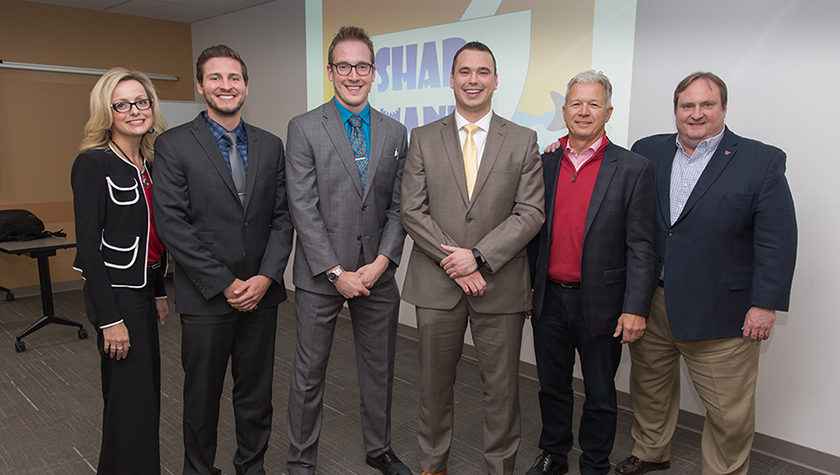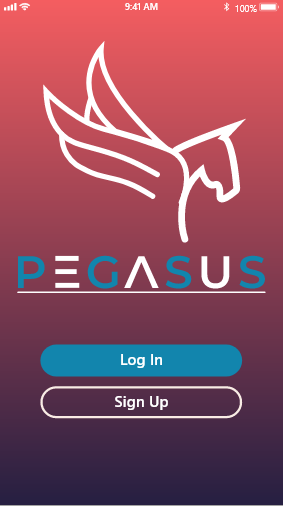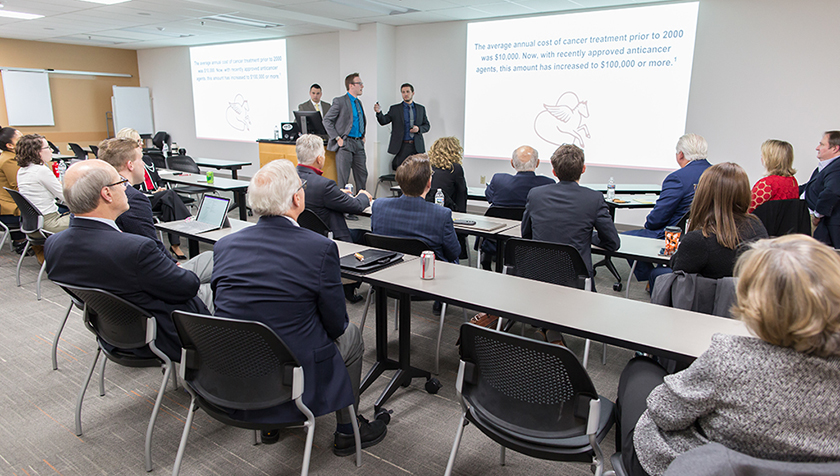
11
December

The School’s 2019 SHARx Tank winners take their business idea to the next level
By Mary Magnuson
Photos by Todd Brown
Undergoing treatment for cancer means gaining the chance to hopefully control or eliminate your disease — but it also means a lot of ups and downs, good days and bad days, until the treatment ends. For some, this tumultuous period lasts only months, or it could be indefinite, in the case of patients living with a terminal diagnosis.
This is what was on the minds of Griffin Budde, Dean Bowen, and Graham Edwardson, fourth-year PharmD students at the University of Wisconsin–Madison School of Pharmacy, during a marathon study session for their oncology class. As they discussed cancer treatment and what it meant for patients’ quality of life, they landed on a solution: a mobile app that would allow patients and their specialty pharmacies to track their oral chemotherapy treatment cycles and side effects, ensuring optimal management of their care.
“The more our team talked about the idea of creating something like our application, the more excited I got,” says Budde. “For me personally, one of my life goals has always been to make a positive impact on how patients receive care. Developing this application allows me to pursue that goal for the patients who need it most.”
The three worked out their plan for the app — which they named Pegasus — throughout the Spring 2019 semester, as part of an entrepreneurial-focused student group. With a business plan and a mockup of the app’s interface in hand, they pitched their idea in the School’s second-annual SHARx Tank, in front of a panel of alumni judges with business savvy — and won.
“If this doesn’t work out, we can say we tried to make the world a better place by helping cancer patients.”
—Griffin Budde
“We knew it might be harder to pitch an ‘idea’ to the sharks versus an actual product,” says Edwardson. “But technology is going to be the way of health care in the future, so we did our homework, and gave a great pitch to show the potential Pegasus has.”
Now, these future Badger pharmacists are taking their idea to the next level with the founding of Pegasus Health Applications, LLC. Having met their fundraising goal through a Kickstarter campaign, they’re now working on developing a prototype to test and optimize the app to have the greatest impact.
A life-changing app
Similar to the popular television show Shark Tank, which gives hopeful entrepreneurs the opportunity to fund their projects through wealthy investors, the School’s SHARx Tank allows teams of student pharmacists involved in the entrepreneurial student group to present a new product or service that could enhance the medical or pharmacy field and compete to receive funding — $4,000 to the winning team, and $1,000 for the runner-up.
This year, Budde, Bowen, Edwardson, and Pegasus won over the judges and the seed money, funded by alumnus George Zorich (BS ’78), CEO of ZEDPharma, who co-leads the entrepreneurial group with Pharmacy Practice Division Chair and Professor Beth Martin (BS ’90, MS ’03, PhD ’06), assistant dean for Assessment, Teaching, and Learning.

“Successful entrepreneurs innovate and grow their ideas,” says Martin. “Griffin, Dean, and Graham are true difference makers and it’s fun to think that it all started with the entrepreneur club and SHARx Tank.”
The group honed their idea and approach through a semester of discussion with Zorich and Martin, as well as with peers and the patients who would use the app in order to narrow their focus and better understand exactly what features would be valuable. In addition to logging side effects and medication cycles, users of the Pegasus app will be able to track their appointments and oncology medication delivery, communicate with providers, find information about therapy and links to support groups, and access a medication list with adherence reminders.
Tracked data will be shared with specialty pharmacists in real time, who can then monitor the patient’s condition and medication use and follow up if necessary.
“There’s a gap in the standard of care when it comes to monitoring and giving the patient all of the tools necessary to manage their fight against cancer,” says Budde. “That’s the gap that Pegasus Health Applications is going to fill.”
All three creators said working face-to-face with cancer patients was the most impactful part of the process.
“To see the actual patient right in front of us and talk to them about their struggle gave us a reason to keep going,” says Budde. “We actually have a mission that we believe in and one we can fully get behind and invest ourselves in.”
Edwardson, who is interested in a career in technology, agrees with Budde, and says that creating this app is all a part of the mission he’s pursuing as a future pharmacist.
“We all share the goal of wanting to take care of patients, and a career like pharmacy gives us a great opportunity to do so.”
The next steps
Following the success of their recent Kickstarter campaign, the team is now moving toward connecting with software coders to create a prototype of the app based on their framework, which will then move to testing and refining before being released. Their plan is to partner with a specialty pharmacy, drug manufacturer or health care system to release the app.
One of the biggest challenges the team faces in developing the app is integrating electronic health records so physicians and pharmacists can see their patient’s treatment schedules and help advise them further, Budde says.
“We’re going for health care systems first because we want to try to help as many patients as possible,” Budde said. “Each health care system has its own security, compliance, HIPAA, and other requirements that will be a challenge to meet, but if we succeed, then physicians and pharmacists within the system will be able to access patients’ medical records and prescription information, which will make the app the most useful.”

The team has been balancing fundraising and promoting their project on top of their regular schedule of school and work, which itself is a steep challenge given that as fourth-year pharmacy students, they’re working through a year of Advanced Pharmacy Practice Experience rotations. But if they can keep momentum behind Pegasus, it could become a full-time project after graduation.
“If we get over certain barriers of funding and are able to integrate with a health care system, we can have a much more serious conversation about us putting 100 percent of our time into taking this chance on ourselves,” Budde says. “Because now’s the time to do it. Now’s the time to bet on ourselves.”
Zorich says the work of Budde, Bowen and Edwardson perfectly embodies the goals of the entrepreneurship club and the SHARx Tank competition, and he looks forward to seeing where they take their project in the future.
“Griffin, Dean, and Graham are true difference makers and it’s fun to think that it all started with the entrepreneur club and SHARx Tank.”
—Beth Martin
“The entrepreneurship club instills a sense of what it takes to take an idea — a possible solution to a health care problem — from beginning to end to develop that idea into a service, product or even a new company,” Zorich says. “Their team has achieved this with Pegasus Health, and as with any entrepreneur, the hard work is just beginning. If they succeed — great. If they fail — they have learned invaluable lessons for the next venture.”
“Our goal as a school should be to continue to instill more entrepreneurial thinking,” he says. “The end result will be pharmacists being seen more as creating solutions — not just as clinicians or dispensers.”
Though the journey has had its ups and downs, Budde says he’s proud of everything they’ve been able to accomplish so far, and he’s grateful for the opportunity to participate in the entrepreneurship club and SHARx tank.
“At the end of the day, this is a learning experience,” Budde says. “If this doesn’t work out, we can say we tried to make the world a better place by helping cancer patients. I think that’s also one of the most rewarding parts of entrepreneurship — you can get excited about what you’re trying to do.”




